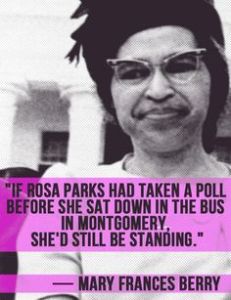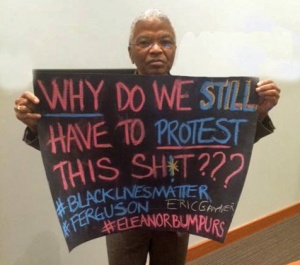February 1, 2016, first posted on Beacon Broadside
Since the Supreme Court in 2013 effectively lifted preclearance requirements for states and counties with a history of race discrimination, states have passed a raft of new voter ID laws and taken other steps which they claim will prevent voter fraud. The challenge to North Carolina’s voter Identification law underway in federal court may be ground zero for this issue.
North Carolina’s identification law requires voters to produce one of six accepted credentials including a driver’s license or passport. Facing immediate criticism from civil rights advocates, the legislature added language permitting the submission of a provisional ballot if the prospective voter submitted a “reasonable impediment declaration” explaining why they lacked identification.
Civil rights advocates consider the law as just another effort to suppress the black vote. One of the plaintiffs is a ninety-four year old woman who had to travel back and forth to distant government offices to get the right documentation because her driver’s license and voter registration card did not match.
The in-person fraud where someone falsely pretends to be a valid voter, cited as a rationale for the new more stringent ID laws, rarely happens. Instead, a more pernicious form of fraud consisting of vote buying and selling is prevalent.
Campaigns get the needy to turn out for them even when they know the candidates don’t do anything for them. As an old lady in Louisiana said, “They don’t do anything for me, they never do what they promise,” but at least they give her a little something—five dollars and a porkchop sandwich. When she and other poor people are induced to cast votes for people who they would otherwise not vote for and who don’t give them anything beyond this “chump change,” it is just another form of voter suppression. Voter fraud indeed exists across the country in state and local elections, but it is through campaigns misusing absentee ballots and buying votes, sometimes with the collusion of voting officials.
Vote buying and selling happens all over the country and is done by operatives for state and local candidates in Chicago, Baltimore and Philadelphia or rural counties in West Virginia or in the parishes of Louisiana and the counties in Mississippi and Texas. Walk-around money and street money is used to prey on old people in nursing homes and the poor wherever they are. All done in the effort to increase turnout of each candidate’s voters.
The outcome of the battle over voter suppression affects not just presidential elections but state and local contests where matters directly affecting daily life, such as roads and schools and clean water, are decided. Court decisions will come in due course, hopefully striking down these voter ID laws and other restrictive measures. But the election calendar will not wait. In some states a vote in the primary is more crucial than in the general election along with votes in state and local elections not just the presidential contest.
We should not place our reliance on the courts. While the litigation fight goes on, civil rights organizations, churches, fraternities and sororities, and other local groups could make sure non-registered voters, who don’t have the resources, possess whatever documentation is required and transport them to the registrar’s offices to obtain IDs. This can be done while working on ending voter suppression. After all, individuals need photo IDs not only to vote but often to even enter buildings where government or medical services or provided. The groups undertaking this work will need outside financial contributions given the intense poverty among local residents without IDs.
Combined with candidates and issues that give the unregistered something to vote for a “Let’s get ID’d, Let’s get registered” campaign may not only inspire more registration but more actual turnout on election Day without vote buying and other fraudulent tactics. More turnout just might lead to positive political change.


